2019 Awards for Outstanding Performance
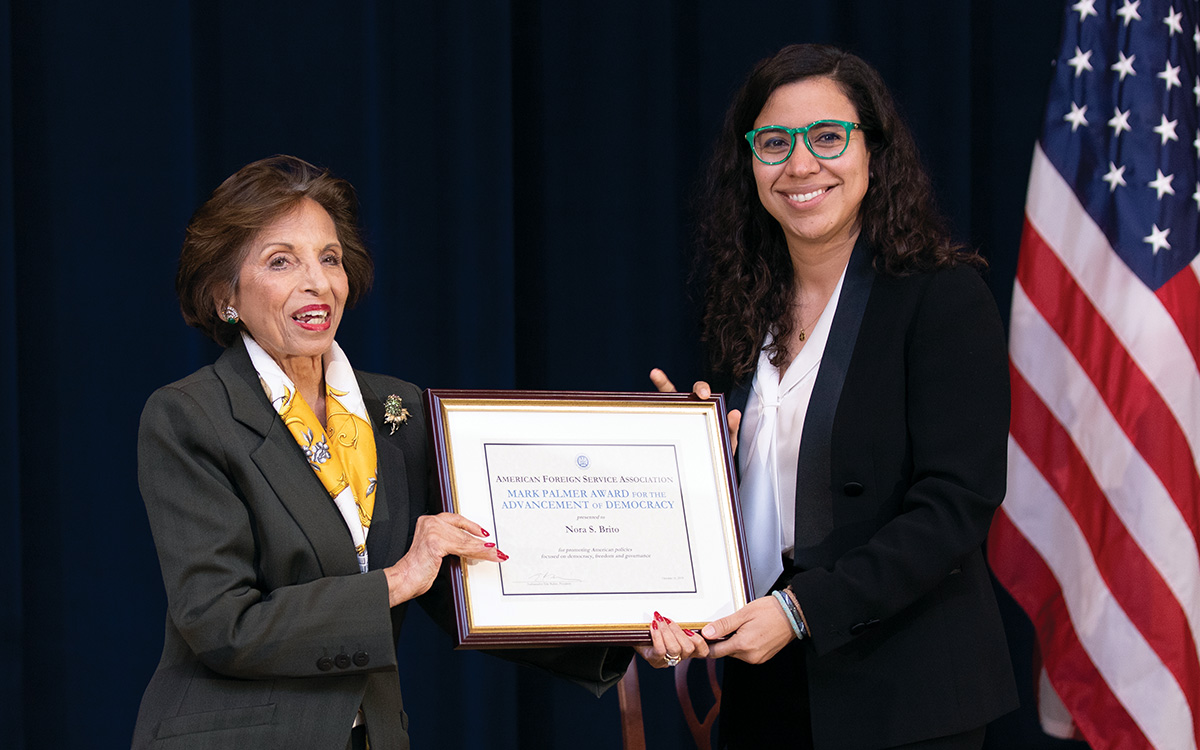
Dr. Sushma Palmer (left) presents the Mark Palmer Award to Foreign Service Officer Nora Brito at the AFSA Awards Ceremony Oct. 16.
AFSA / Joaquin Sosá
Mark Palmer Award for the Advancement of Democracy
NORA BRITO: PROMOTING DEMOCRACY IN VENEZUELA
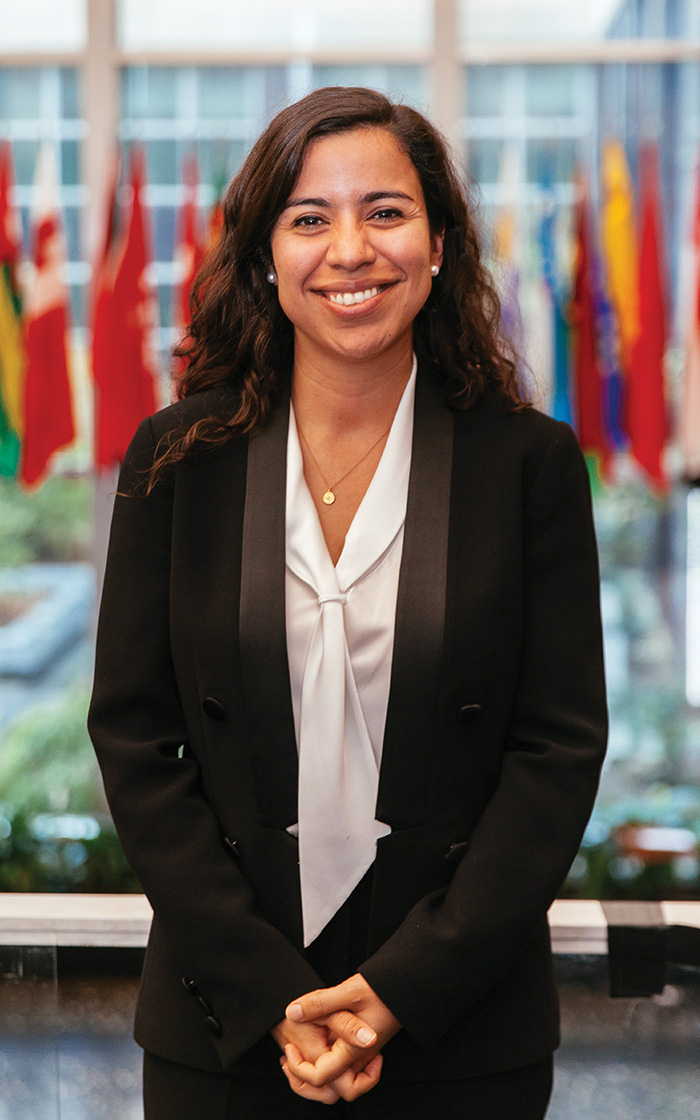
Nora Brito.
AFSA / Joaquin Sosá
Nora Brito is recognized for her work to promote a new generation of leaders to restore democracy in Venezuela.
Shortly after Ms. Brito’s arrival as a political officer at U.S. Embassy Caracas in 2017, she created an informal group of 12 young members of the Venezuelan National Assembly. This group included members from all sectors of the Venezuelan opposition.
Using her strong relationship-building skills and substantive knowledge of Venezuelan politics, Ms. Brito built honest, long-lasting relationships with the group. These interactions provided her, Embassy Caracas and Washington a fresh perspective on the Venezuelan political situation.
“Since day one, Nora has focused on advancing democracy and freedom in Venezuela,” Venezuela Affairs Unit Chargé d’Affaires James Story said. “Her imaginative efforts have proven effective in creating a space for the new generation of Venezuelan leaders to fight for democracy and a better future for all Venezuelans.”
Over the past several years, Venezuelan President Nicolas Maduro has undermined democratic institutions, culminating in fraudulent May 2018 presidential elections and a sham January 2019 presidential inauguration. Against this backdrop, Embassy Caracas had been working to unite a fractured opposition and find a new generation of leaders to restore democracy.
Ms. Brito, an entry-level political officer, accepted the challenge and discovered a young generation of lawmakers that could potentially bridge the generational gap with the “old guard.”
Once Ms. Brito discovered this group, she took the next step to help empower them. Working with other State offices and USAID, she developed multiple programs enabling the parliamentarians to connect with grassroots organizations and learn about monitoring elections, reforming law enforcement and strengthening democratic institutions.
These programs helped strengthen the group members’ knowledge base and experience, enabling them to be stronger, more active participants in restoring Venezuela’s democracy.
A young National Assembly deputy, Juan Guaidó, emerged from this group. At the time relatively unknown, Mr. Guaidó worked across the opposition to garner support, and the National Assembly elected him as the body’s president in January 2019.
After Mr. Maduro’s sham election and in line with the Venezuelan constitution, Mr. Guaidó, with the support of all opposition parties and the Venezuelan people, declared himself interim president of Venezuela until new, free and fair elections could be held.
The United States immediately recognized Mr. Guaidó as president; and, to date, more than 50 countries around the world recognize him and his efforts to develop an inclusive democratic transition in Venezuela.
While Mr. Guaidó has been the face of the movement, the other 11 parliamentarians from Ms. Brito’s group are working with him as heads of National Assembly commissions and are involved in humanitarian assistance and reconstruction efforts.
In the face of harassment, extrajudicial arrests and violence, this group is bravely putting their lives on the line to fight for democracy and the future of Venezuela. Ms. Brito saw the value of listening to these young leaders and providing them access and resources to promote democratic values and institutions.
When given the opportunity to go further, she connected these leaders with embassy leadership and, ultimately, helped shape today’s Venezuela where the people finally can work to restore democracy.
Nora Brito joined the Foreign Service in 2014. Her first tour was in Port of Spain, the capital of Trinidad and Tobago, where she worked in the Non-Immigrant Visas and American Citizen Services sections.
She started her second tour, in Caracas, in April 2017 as a political officer and, following the drawdown of Embassy Caracas, took on a new role as an adviser to Special Representative for Venezuela Elliott Abrams.
Prior to joining the Foreign Service, Ms. Brito received her master’s degree from Johns Hopkins University’s School of Advanced International Studies. She received a bachelor’s degree in international relations and economics from American University.
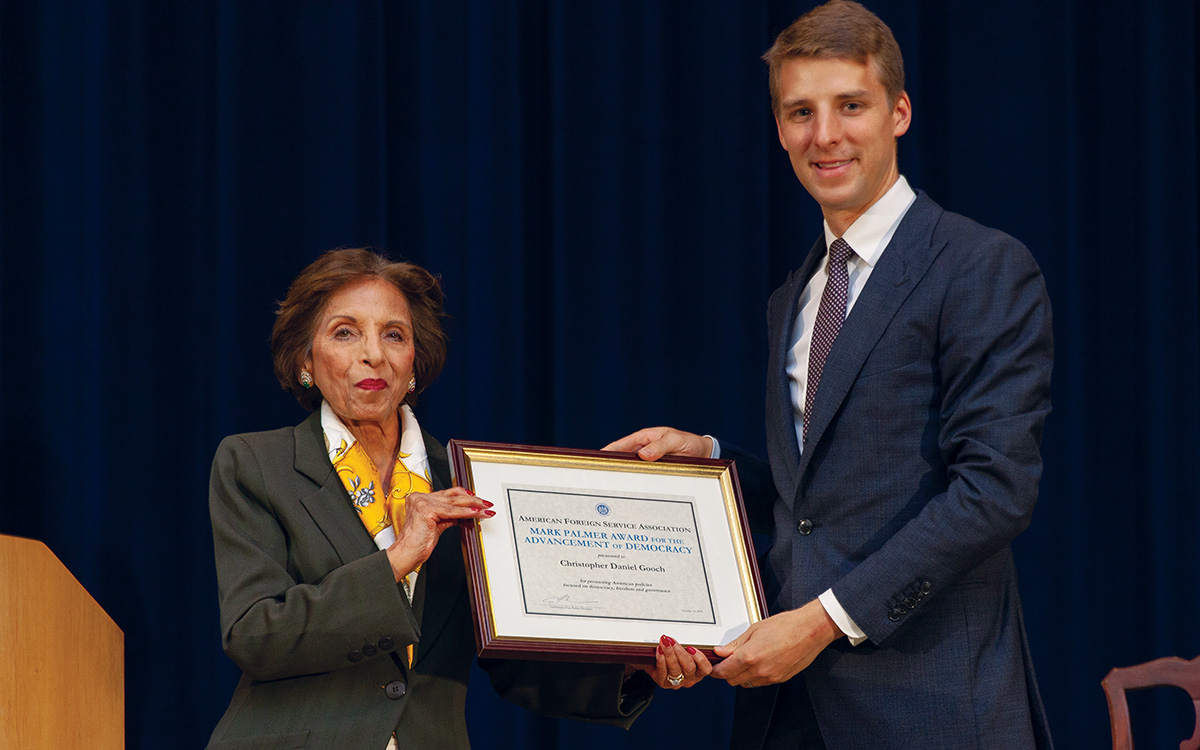
Dr. Sushma Palmer (left) presents the Mark Palmer Award to Foreign Service Officer Christopher Gooch at the AFSA Awards Ceremony Oct. 16.
AFSA / Joaquin Sosá
Mark Palmer Award for the Advancement of Democracy
CHRISTOPHER GOOCH: PROMOTING U.S. VALUES IN IRAQ AND NEPAL
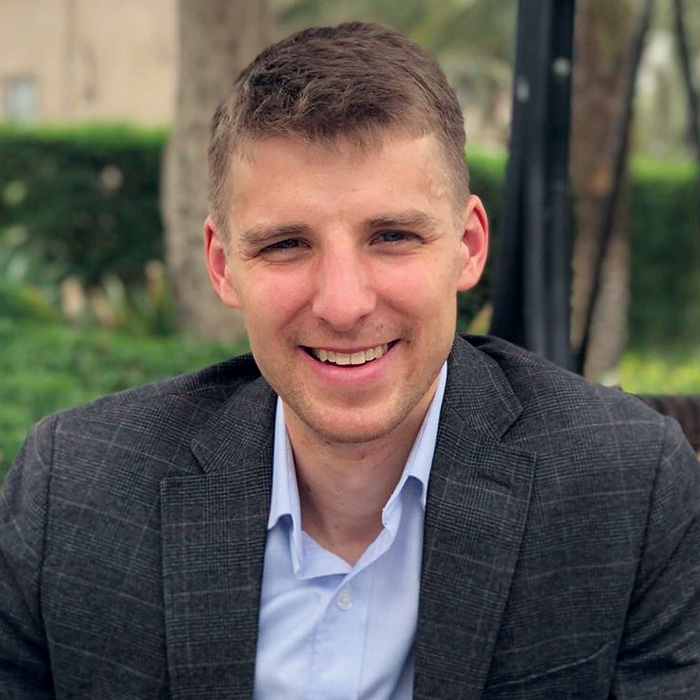
Christopher Gooch.
Courtesy of Christopher Gooch
Christopher Gooch is a forceful advocate for U.S. and universal human rights and values who made bold and imaginative efforts to expand democracy, freedom and good governance during assignments in Iraq and Nepal.
In Iraq, he helped protect female civil society activists, persuaded the Iraqi government to act to protect trafficking victims and helped launch an initiative aimed at resolving the Kirkuk dispute. In Nepal, he crafted a transitional justice strategy, triggering the first movement on the issue in four years.
During a period of intense civil unrest in Basrah, Iraq’s major port city and oil hub, extremists began targeting female leaders who appeared in the media with U.S. officials. After one woman was assassinated, others were subjected to online threats in what appeared to be coordinated efforts to intimidate them into silence.
Urgently seeking avenues to protect them, Mr. Gooch organized a team to identify accounts being used to threaten the women leaders and inform U.S.-based social media companies of these terms-of-service violations.
Mr. Gooch also helped provide expedited assistance through the Human Rights Defenders’ Fund—run by the State Department’s Bureau of Democracy, Human Rights and Labor—enabling activists to shelter safely. His efforts to protect these brave women sent a powerful message of the United States’ support for equal rights and democratic freedoms in Iraq.
In another vital human rights area—countering human trafficking—Mr. Gooch acted to overcome Iraqi government resistance to cooperation. He built a coalition of Iraqi allies across its police and bureaucratic structures and used a series of interagency meetings to explain the practical and ethical imperatives for action.
Through persistent engagement, he convinced his interlocutors to cooperate to develop Iraq’s first action plan to combat human trafficking and to dedicate resources to achieving the goals they identified. Mr. Gooch’s actions enabled Iraq to come into alignment with the department’s approach to combatting trafficking.
Mr. Gooch’s work also sparked new optimism in Iraq after 50 years of unresolved conflict in Kirkuk. He showed extraordinary leadership in conflict resolution in a territory where conflict between Arabs, Kurds and Turkmen resulted in a political power vacuum and ethnic tension, fuel for a potential ISIS resurgence.
His engagement with local political, tribal and civil society leaders, United Nations representatives and international mediators resulted in an embassy decision to actively foster reconciliation and reanimate moribund negotiations between ethnic groups.
In Kathmandu, Mr. Gooch led the Human Rights Core Group and an interagency working group on countering trafficking in persons. He organized roundtables that united U.S. agencies, the Nepalese government, civil society and employment agencies in tangible cooperation, and garnered specific commitments from the Nepalese government to address trafficking-in-person action-plan recommendations.
Mr. Gooch’s groundbreaking reporting on the problem highlighted a previously unrecognized form of trafficking in persons—“orphanage trafficking”— providing a more complete picture to inform programming and advocacy.
Christopher Gooch currently serves as refugee coordinator in Jerusalem. He has previously served tours as a political officer covering human rights in Baghdad and Kathmandu, and as a consular officer in Riyadh.
He received a bachelor’s degree in international politics from Georgetown University’s Edmund A. Walsh School of Foreign Service and conducted post-graduate Arabic study at the Institut Français du Proche-Orient in Aleppo, Syria. Born and raised in Salt Lake City, Utah, he speaks Arabic, Nepali and Spanish.
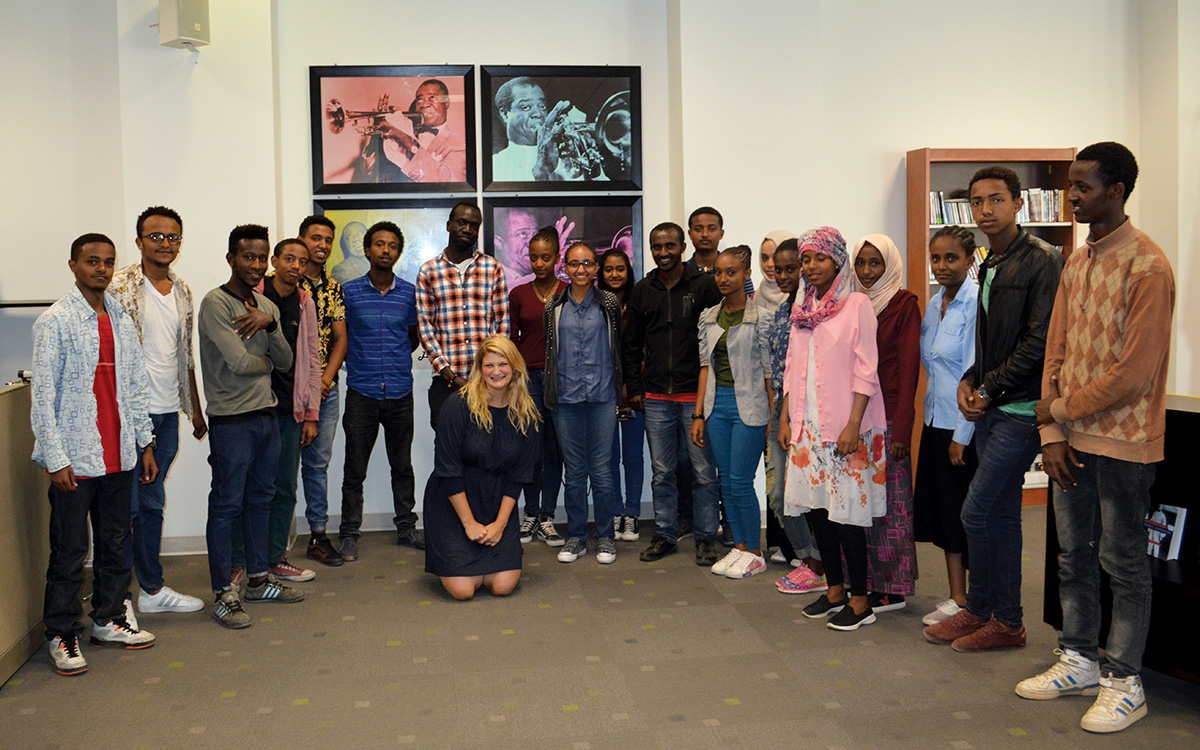
Katherine Koehler with a group of Ethiopian musicians who came to a presentation she gave on black opera singers during Black History Month.
Courtesy of Katherine Koehler
Nelson B. Delavan Award for an Office Management Specialist
KATHERINE ELIZABETH KOEHLER: TAKING ON MANY TASKS IN ETHIOPIA
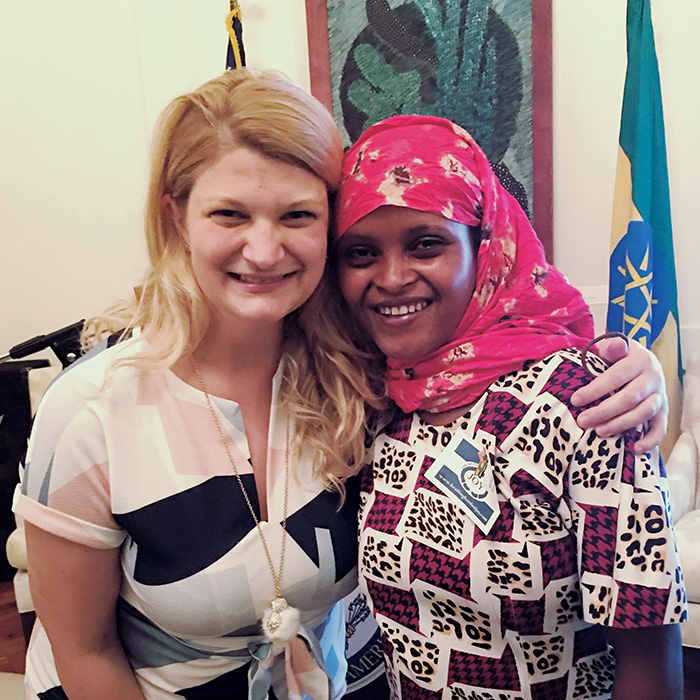
Katherine Koehler, left, with Kariftu, a Safe Motherhood Ambassador for the Healing Hands of Joy organization.
Courtesy of Katherine Koehler
In addition to her full-time role as an office management specialist (OMS), Katherine Elizabeth Koehler simultaneously serves as U.S. Embassy Addis Ababa’s de facto full-time staff assistant and has been instrumental in tracking and coordinating multifaceted efforts to support major Ethiopian governmental reforms.
Ambassador Michael Raynor, who nominated her for the Delavan Award, calls Ms. Koehler “the finest OMS I’ve worked with in my 31-year career.”
During the past year, Ethiopia underwent a stunning reinvention from a country deeply hostile to democracy, human rights and free-market economics to one that welcomes an expanded relationship with the United States while pursuing a huge reform agenda to embrace Western values, foreign investment and multiparty democracy.
If successful, Ethiopia’s ambitious but vulnerable reforms will benefit core U.S. security, commercial and political interests. Helping the reforms succeed, which has enormously increased the volume and complexity of the workload at Embassy Addis, is one of the U.S. government’s top priorities in Africa.
Ms. Koehler led an interagency project to survey Ethiopia’s population to learn how they feel about their country’s reform agenda and the United States. Also in her staff assistant role, Ms. Koehler superbly supported the embassy’s interagency response to a major Ethiopian Airlines crash in March that involved a U.S.-built aircraft and the tragic deaths of 157 people.
During long and stressful days over several weeks, Ms. Koehler secured multiple high-stakes and last-minute meetings and phone calls for Amb. Raynor with senior Ethiopian officials to elicit candor and ensure U.S. participation in the crash investigation. She coordinated daily situation reports to Washington and ensured empathetic and responsive front office support to families of American crash victims.
In addition, she organized—and wrote excellent remarks for—a major reception that promoted women’s empowerment while spotlighting efforts to combat obstetric fistula, a devastating condition that afflicts many Ethiopian women at childbirth. Despite this difficult focus, the event was exhilarating thanks to Ms. Koehler’s success in ensuring the right preparations, guest list and messaging.
Winning the Nelson B. Delavan Award is an incredible honor. I could not have come this far in my career without the expert guidance of fellow OMSes and innovative supervisors who allowed me to seek out new responsibilities and empowered me to make changes when and where I was able.
–Katherine Koehler
Ms. Koehler also became an Equal Employment Opportunity counselor and has provided EEO training to more than 100 local staff members, many of whom had never had such training before. She hosted a charity clothing swap that donated 300 pounds of clothes to charity.
“Winning the Nelson B. Delavan Award is an incredible honor,” Ms. Koehler said. “I could not have come this far in my career without the expert guidance of fellow OMSes and innovative supervisors who allowed me to seek out new responsibilities and empowered me to make changes when and where I was able.”
She would especially like to thank Susan Walke, Tiffany Byrd, Jacob Rocca and Kathleen Morenski for their leadership and guidance, as well as her current supervisor, Amb. Michael A. Raynor.
Katherine Elizabeth Koehler joined the Department of State as an office management specialist in 2013. She served previously in Kathmandu, Islamabad and Warsaw, and is currently serving in Addis Ababa.
A native of Charleston, South Carolina, she also spent two years working at the Global Financial Service Center as a contractor. She has two degrees in music (vocal performance) from Florida Southern College and Georgia State University.
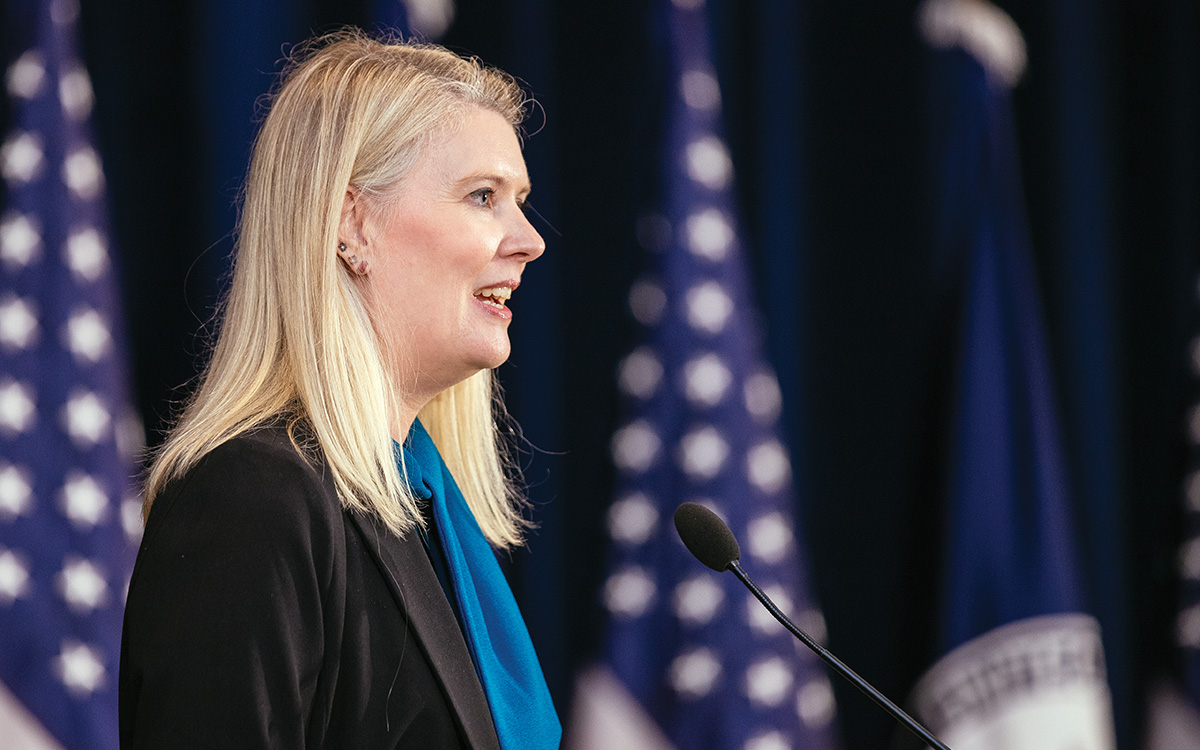
Michelle Ross, addressing the audience in the Dean Acheson Auditorium of the State Department after receiving the 2019 Guess Award.
AFSA / Joaquin Sosá
M. Juanita Guess Award for a Community Liaison Office Coordinator
MICHELLE ROSS: EXTRAORDINARY STEPS EASE AN ORDERED EVACUATION
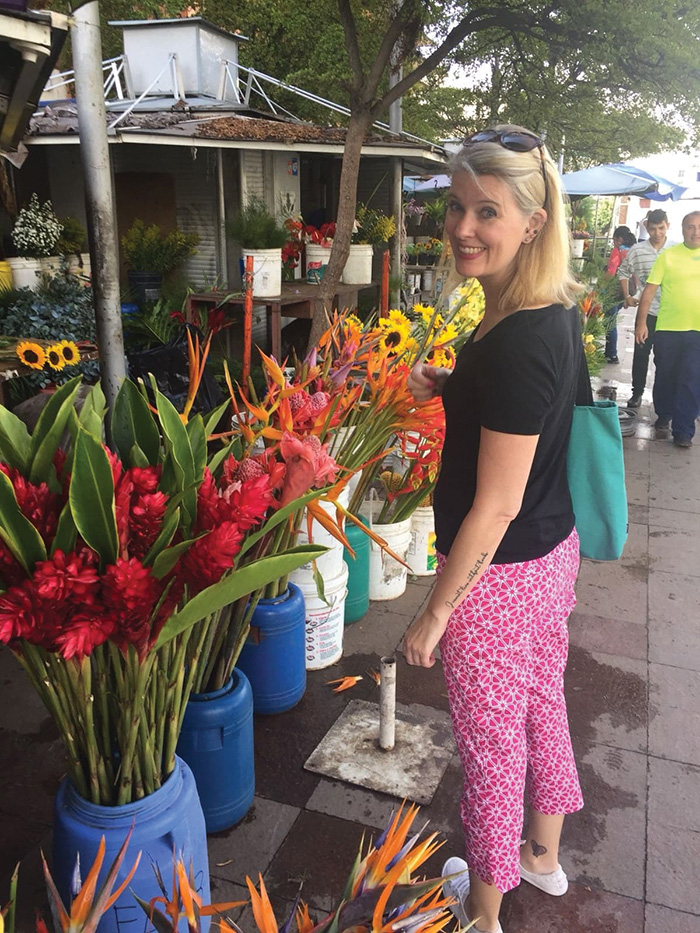
Michelle Ross at a local market flower stand in Caracas, Venezuela.
Courtesy of Michelle Ross
Michelle Ross is honored for her extraordinary efforts to assist Embassy Caracas personnel and family members who were quickly evacuated after the Venezuelan government broke diplomatic ties with the United States in January 2019.
Ms. Ross, a Foreign Service spouse who joined the Caracas Community Liaison Office team in August 2018, was a key ally to evacuees during the difficult transition that followed, working with the management section and the Family Liaison Office to facilitate the swift evacuation of 79 Americans and 22 pets.
“I can think of no one more deserving of this award,” said James Story, chargé d’affaires of the Venezuela Affairs Unit, the interim diplomatic office of the U.S. government to Venezuela, based at Embassy Bogotá. “At every step of Michelle’s assignment, she demonstrated leadership and a genuine dedication to her community.”
Ms. Ross had maintained a spreadsheet of all incoming and outgoing personnel since her arrival at post. She knew the whereabouts of officers on travel and had updated personal contact information for all U.S. direct hires. She had a record of all pets and pet owners in the embassy community.
When Ms. Ross learned about the ordered evacuation, she immediately contacted a local veterinarian who agreed to visit the embassy the following day to give vaccinations and complete pet exportation documents required by U.S. and Venezuelan authorities and American Airlines. Even the pets of employees who were on travel were able to be evacuated through her efforts.
Ms. Ross did this while coordinating other logistics to facilitate the evacuation, relieve employees’ anxiety and provide relevant information to the community.
To ease the community’s arrival in Miami, she coordinated with the regional security office to have U.S. Customs and Border Protection and Transportation Security Administration agents assist evacuees through customs.
Ms. Ross was in the first group to depart post. She coordinated with current and former Caracas personnel in the Washington, D.C., area to organize a welcoming committee for each of the four flights that carried evacuees. She even arranged for taxis and luggage collection.
In short, she made the evacuation more bearable by surrounding the community with support every step of the way.
After the Venezuela evacuation, Ms. Ross “paid it forward,” mentoring CLOs in Haiti and Sudan when those posts experienced ordered departures.
“Winning the M. Juanita Guess Award is really a testament to the amazing CLO team in Caracas and the outstanding community we had at a difficult post,” Ms. Ross said. “I was blessed to work with a stellar and tireless assistant CLO and a local staff administrative assistant who could and did work miracles.”
Michelle Ross served as CLO for Embassy Caracas at post and in Washington, D.C., during the post’s ordered departure. Previously, she worked at the Family Liaison Office as the CLO program specialist in Washington, D.C., providing operational and program support to CLO coordinators worldwide.
Prior to joining the FLO, Ms. Ross worked as a consular associate in Kuala Lumpur and as the CLO in Chengdu. Before her husband joined the Foreign Service as a consular officer in 2011, she taught eighth-grade English and reading for nearly a decade and spent two years as a Peace Corps Volunteer in Gansu, China.
Ms. Ross earned a bachelor’s degree in secondary English education from Brigham Young University and graduate degrees in middle-level education (Walden University) and literature and writing (Union Institute and University).
While on breaks from her work supporting the Foreign Service community, Ms. Ross can be found reading the latest literary releases or typing up reviews (on a real typewriter) for her book review blog.
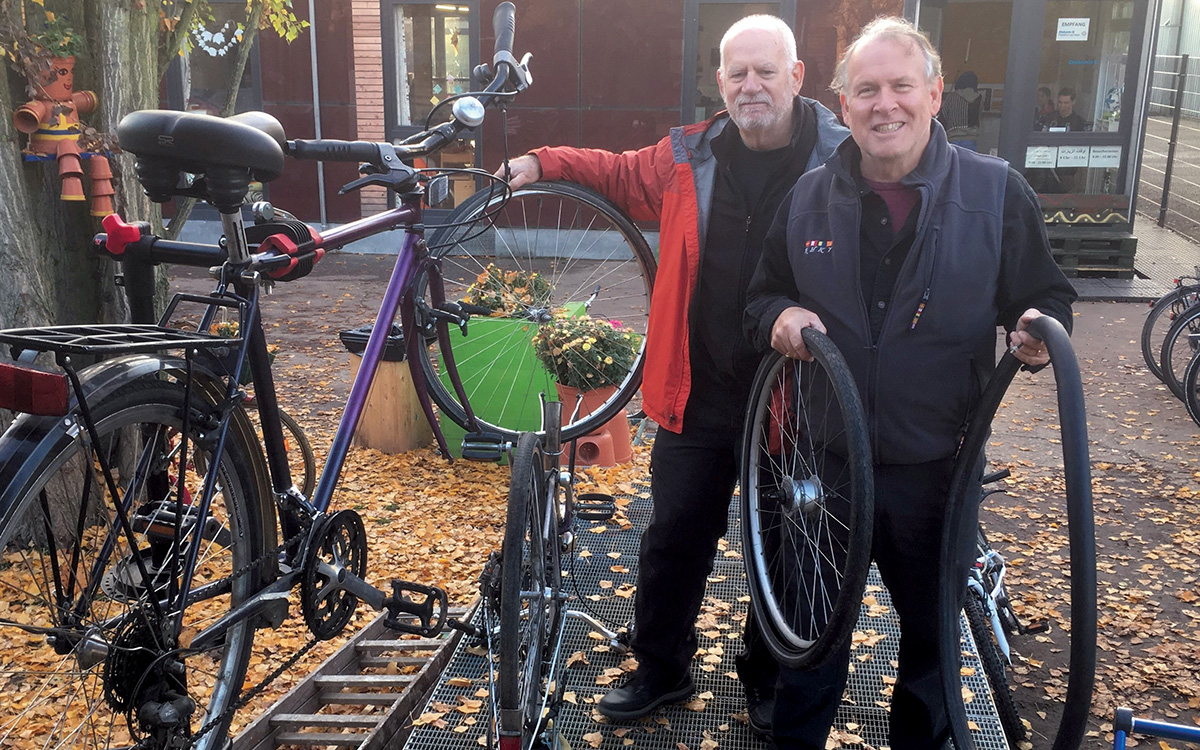
Laurent Charbonnet, right, and retired FSO Paul Cantrell work on bikes at a refugee center in Frankfurt.
Courtesy of Laurent Charbonnet
Avis Bohlen Award for a Foreign Service Family Member
LAURENT CHARBONNET: BICYCLE DIPLOMACY HELPS REFUGEES IN FRANKFURT
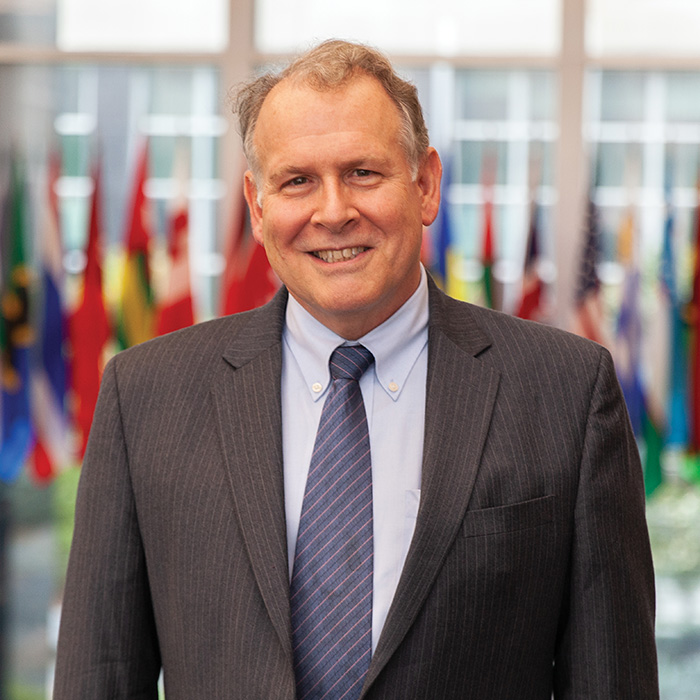
Laurent Charbonnet at the AFSA Awards Ceremony at the State Department Oct. 16.
AFSA / Joaquin Sosá
Laurent Charbonnet, a Foreign Service family member and retired FSO at U.S. Consulate General Frankfurt, has received the Avis Bohlen Award for the diplomacy via bicycles program he initiated through the consulate community’s Frankfurt Refugee Outreach Committee.
Mr. Charbonnet volunteers weekly as a bicycle mechanic at a refugee center in Frankfurt’s Bonames district. The center is home to hundreds of recently arrived refugees who rely on volunteers like Mr. Charbonnet to develop survival and self-sufficiency skills.
Over the past three years, the informal bicycle program has significantly enhanced the morale of Consulate Frankfurt’s community, said Stephan Langley, a general services officer: “Laurent’s initiative and volunteerism serve as an inspiration and model for others, and his visionary leadership will ensure that the program and the consulate’s ties to Frankfurt’s refugee community will endure long after his departure from post.”
At the center, refugees acquire English-language proficiency, learn the cultural mores necessary for integration, and ultimately prepare themselves for employment and schooling in Germany.
Mr. Charbonnet collects donated bicycles from the consulate community and elsewhere. He volunteers his time, energy and effort to repair and replace broken parts, creating safe, functional bicycles from myriad pieces.
The bicycles have given refugees greater mobility and new recreational opportunities for their children.
“I want to recognize the hard work of the consulate’s volunteer refugee assistance group,” Mr. Charbonnet said in accepting the Bohlen Award.
“My work maintaining some 300 bicycles at one of the refugee centers is just one facet of what they do. And once I’d built up my skills and specialized tools, it just seemed natural to start fixing bikes for the consulate community.”
Mr. Charbonnet credited his late father, Arthur, for teaching him to repair bicycles a half-century ago in New Orleans. Born and raised in New Orleans, he earned a bachelor’s degree in Asian studies from Vassar College in Poughkeepsie, New York.
Laurent’s initiative and volunteerism serve as an inspiration and model for others, and his visionary leadership will ensure that the program and the consulate’s ties to Frankfurt’s refugee community will endure long after his departure from post.
–Stephan Langley, ConGen Frankfurt
He was a member of the first group of American exchange students to go to the People’s Republic of China after the United States and China established diplomatic relations, spending his junior year abroad in Beijing from 1979 to 1980. After graduation, he worked as a visa interviewer and agricultural commodities reporter for the American Institute in Taiwan.
In 1987 he became a Foreign Service officer. He retired from the Foreign Service in 2016, after serving overseas in the Philippines, Shenyang, Taipei, Hong Kong (twice), Singapore and Baghdad, and domestically in the Arms Control Bureau, the Japan desk, the National Security Council, the Bureau of Economic and Business Affairs, and the Office of the Inspector General.
After retiring, he proudly took up a support role as an eligible family member to his FSO wife, Michelle Burton. He enjoys indulging his passions for sailing, cycling (and bicycle repair) and travel—combining them when he can. He eagerly awaits his first grandchildren, while trying not to put too much pressure on sons Paul and Daniel.
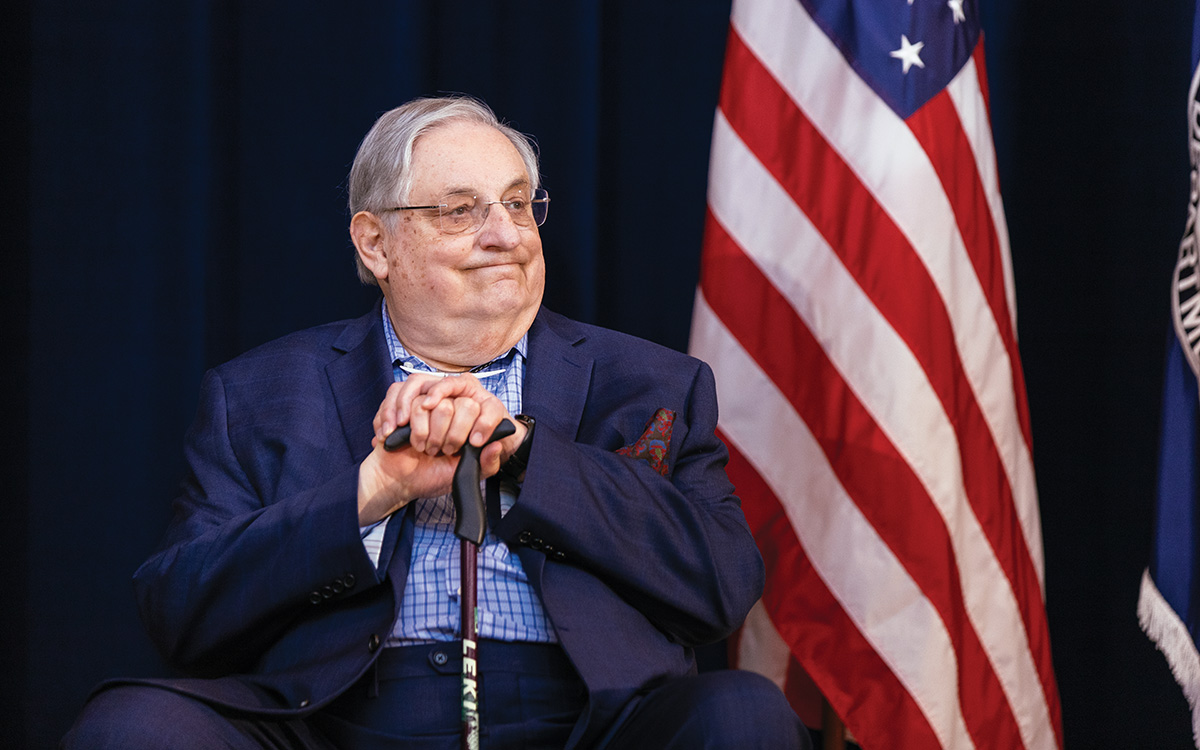
“Tex” Harris at the AFSA Awards Ceremony at the State Department Oct. 16.
AFSA / Joaquin Sosá
2019 Award for Achievement and Contributions to the Association
F. ALLEN “TEX” HARRIS: “MR. AFSA”—50 YEARS OF ACTIVE ENGAGEMENT
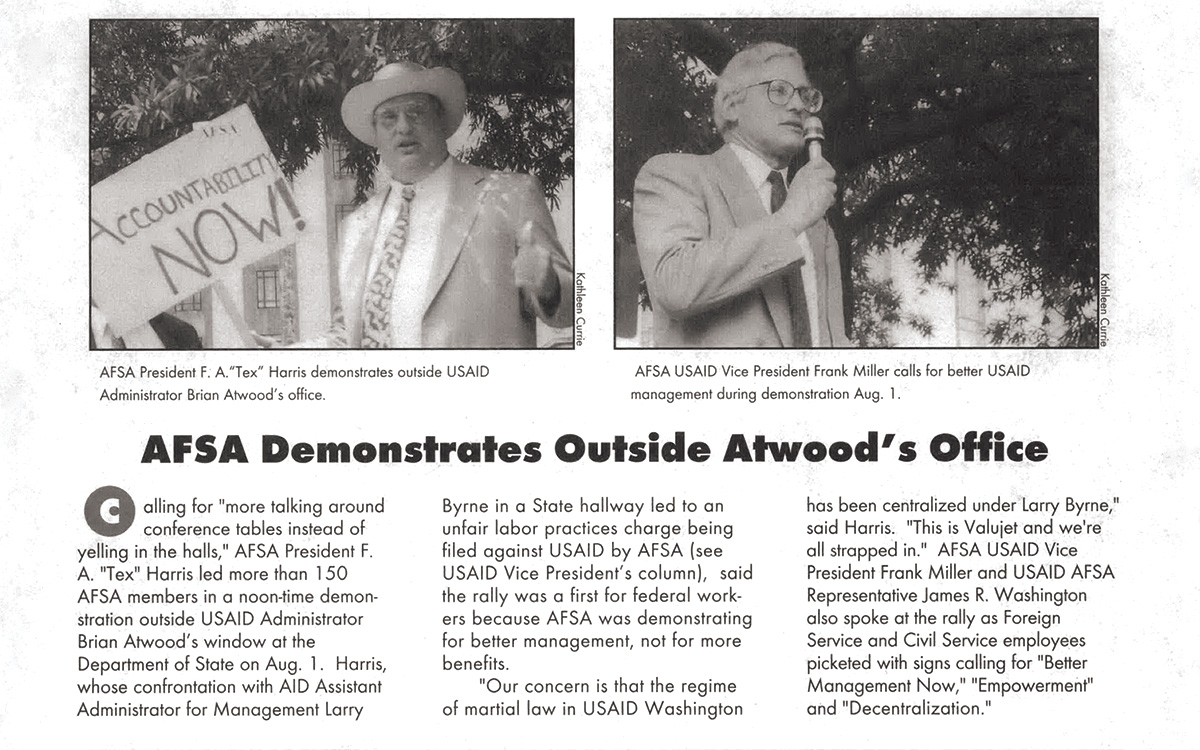
During his second term as AFSA president, in August 1996, Tex Harris (at left) led a demonstration outside USAID Administrator Brian Atwood’s office to demand “better management” at the agency, where reductions-in-force (RIFs) were decimating Foreign Service ranks. USAID VP Frank Miller is at right.
AFSA / FSJ September 1996
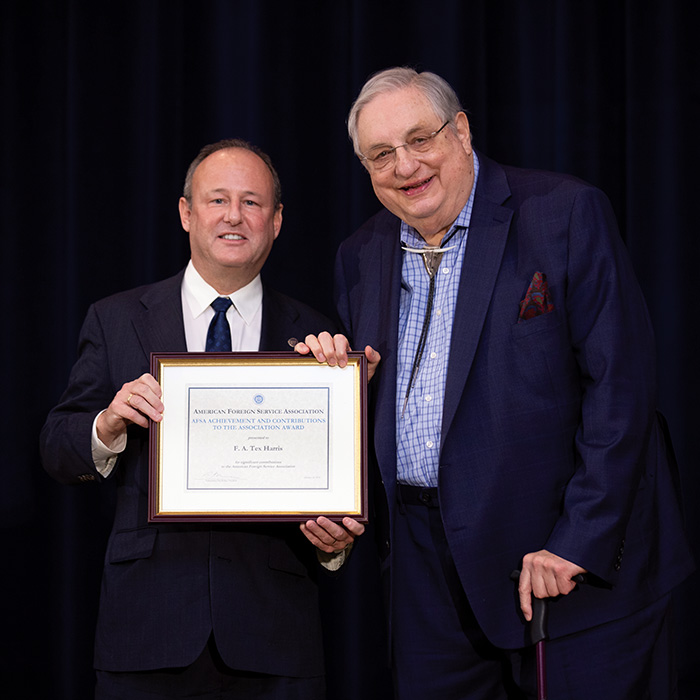
AFSA President Eric Rubin (left) presents F. Allen “Tex” Harris with the AFSA Achievement and Contributions to the Association Award at the AFSA Awards Ceremony Oct. 16.
AFSA / Joaquin Sosá
F. Allen “Tex” Harris, a retired FSO and a titan of the Foreign Service, was selected to receive the 2019 Award for Achievement and Contributions to the Association for his vital and continuous involvement in AFSA over the past 50 years.
As a “Young Turk” working with Tom Boyatt, Lannon Walker, Charlie Bray, Hank Cohen and others starting in 1969, he was instrumental in ensuring that American diplomats had a clear voice in establishing the standards for their profession and that AFSA would be an institution that would defend both the Service and its members. Mr. Harris was the State VP for the 1973 to 1976 AFSA Governing Boards, led by Bill Harrop and Tom Boyatt, respectively. During this time, AFSA became the union for all Foreign Service employees. Tex, as he is known by all who know him, was instrumental in drafting and negotiating the core labor-management agreements in the foreign affairs agencies.
An attorney, Tex was AFSA’s in-house counsel in the early to mid-1970s. He was one of four drafters of the 1976 legislation that led to the Foreign Service grievance system, which was eventually adopted in the Foreign Service Act of 1980.
He remained active in AFSA throughout his distinguished 36-year Foreign Service career, serving two terms as AFSA president from 1993 to 1997. During his tenure as president, he battled against RIFs (reductions-in-force) in USAID, government shutdowns and the appointment of unqualified political ambassadors.
He also fought against major management abuses such as naming Diplomatic Security protective detail agents “managers” to avoid payment of millions of dollars of overtime, and gaining significant benefit increases for service overseas. He helped secure improvements to conditions of service and pushed for ending ethnic, gender and racial discrimination within the State Department.
Following his retirement from the Foreign Service in 1999, Harris received the Distinguished Honor Award (the State Department’s highest award) for his achievements in reporting on and opposing the massive human rights abuses of the Argentine military dictatorship's “Dirty Wars” of the late 1970s. Posted in Argentina during that time, he had been identified for selection-out after leaving Buenos Aires for that same work. His courageous role during that period has been profiled on TV and in publications and has been cited by AFSA and others as a prime example of what professional diplomacy can accomplish in the face of internal opposition.
In 1984 AFSA recognized Tex Harris with the William R. Rivkin Award for Constructive Dissent by a Mid-Level Officer for the “courage, strength of character, and dedication to the Foreign Service” he demonstrated during his tour in Buenos Aires. The award noted that Harris displayed not only physical courage, but “bureaucratic courage to stand up for what was right despite unnecessary obstacles placed in his way.”
He was honored again, in 2013, for his work in Argentina, when the United Nations Association of the National Capital Area presented him with their Award for the Use of Diplomacy to Advance Human Rights.
In the early 1980s, Mr. Harris was the first person fired by President Reagan’s EPA administrator, Ann Gorsuch, for his efforts as head of that agency’s International Activities Office in seeking to ban CFCs, which were destroying upper atmospheric ozone, creating a hole above the Antarctic.
As a retiree, Mr. Harris continued his close involvement with AFSA. In 2000, he established AFSA’s “Tex Harris Award” for constructive dissent by a Foreign Service specialist— bringing the same recognition to Foreign Service specialists as has been afforded to Foreign Service officers since 1968.
AFSA members elected him to multiple terms on AFSA governing boards in the 2000s and 2010s as secretary and retiree representative, and he contributed much to setting AFSA’s agenda and policies during these years.
In recent years, he has been active in several of AFSA’s sister organizations that work to advance the interests of the Foreign Service. He served several terms on the board of directors of the Association for Diplomatic Studies and Training, which collects and manages the Foreign Service oral history program, and is currently a coordinator for the group Foreign Affairs Retirees of Maryland and D.C.
Widely referred to as Mr. AFSA, Tex Harris remains in contact with hundreds of retired Foreign Service colleagues who have held senior positions over the past 50 years.
Mr. Harris is also currently the producer of the ADST Video/Podcast series, “Tales of American Diplomacy,” which screened its first “TAD Talk” episode on C-Span in November.
Widely referred to as Mr. AFSA, Tex Harris remains in contact with hundreds of retired Foreign Service colleagues who have held senior positions over the past 50 years—sharing information with them and connecting them with other colleagues to discuss the issues facing today’s Foreign Service.
He is an active member of the group of former AFSA presidents who advise AFSA and other Foreign Service groups.
Mr. Harris is currently traveling to present lectures on climate diplomacy, which he subheads, “No more prizes for predicting the rain, only for building the Ark.”
In accepting the award, Mr. Harris forecasted the critical role American diplomats will have in combating global warming under the voluntary National Determined Commitments regime established in the Paris Accords.
“The U.S. Foreign Service will be called on to meet its greatest challenge since the Cold War in convincing elites and publics in more than 200 nations to ratchet up their cuts in fossil fuels to save the planet from further overheating,” he said during his remarks accepting the award Oct. 16.
“We have probably already lost the coral reefs, much of the arctic ice and low-lying areas of Alexandria, Miami Beach and Lower Manhattan to global warming,” Tex continued. “American diplomacy must lead the way to protect the planet from major damage. ...
“New times, new challenges. Onward. Go AFSA!” he concluded.
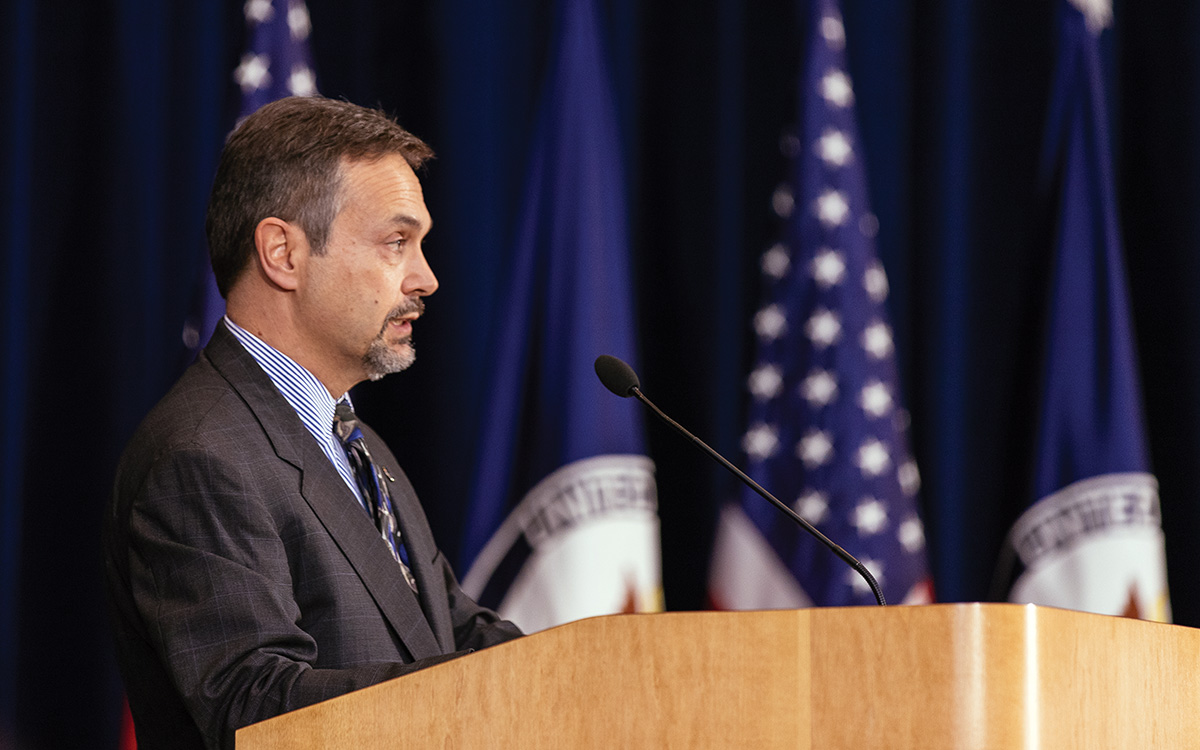
Larry Fields delivers remarks after receiving the 2019 AFSA Post Representative of the Year award.
AFSA / Joaquin Sosá
AFSA Post Representative of the Year
LARRY FIELDS: BRINGING AFSA BACK TO FRANKFURT
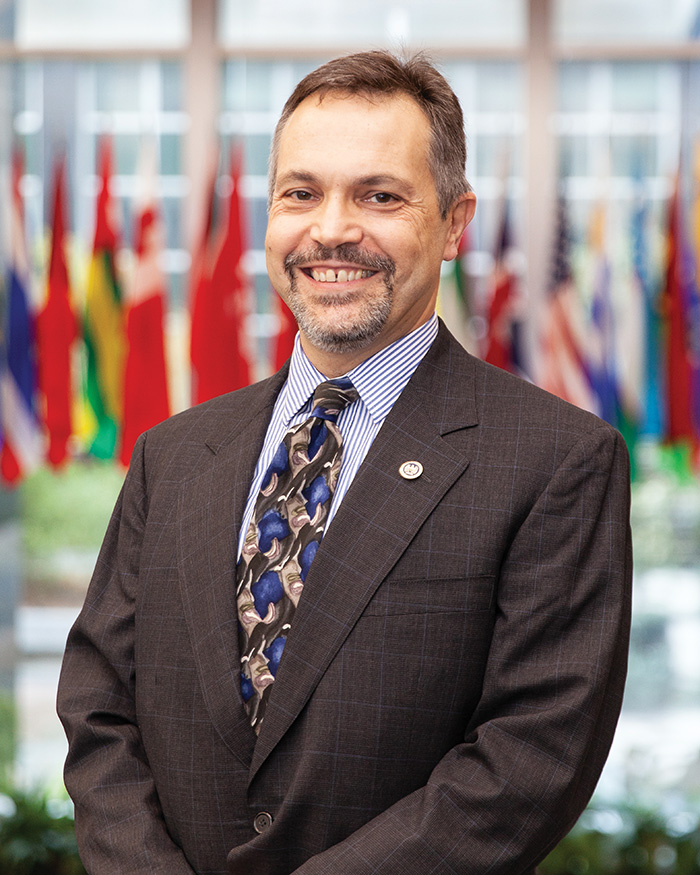
Larry Fields at the AFSA Awards Ceremony at the State Department Oct. 16.
AFSA / Joaquin Sosá
Larry Fields is recognized as Post Representative of the Year for his work as the AFSA liaison at U.S. Consulate General Frankfurt. One of the largest posts in the world, ConGen Frankfurt boasts 200 direct hires from State alone, and it is host to a variety of regional offices covering information technology, security engineering, courier operations and more. But the post had gone without an AFSA post representative for several years.
Mr. Fields revived AFSA’s presence by organizing an election for the position of post representative. He created an AFSA email group to keep members in Frankfurt informed of developments throughout the year and launched an “AFSA Corner” column in the Community Liaison Office weekly newsletter. He recruited a USAID post representative and a State alternate representative to serve members’ needs.
Mr. Fields worked with the CLO to make sure that its regular newcomers orientation briefs included a short presentation from post representatives describing AFSA benefits.
During last winter’s partial federal government shutdown, Mr. Fields hosted an informational lunchtime meeting to share information, answer questions and concerns, and pass on queries to AFSA headquarters. At an embassy town hall on the shutdown, he answered AFSA-related inquiries and reminded employees to avoid violating rules against lobbying elected leaders using government resources.
He also established an excellent working relationship with the consul general and the deputy principal officer at post. He has had several opportunities to build on these relationships, including one case in which a section head at post attempted to require employee attendance at a Saturday barbecue. Mr. Fields worked with the DPO and HR to ensure that the section head learned that this was neither legal nor appropriate, resolving the issue. He has been an AFSA rep at two other posts, and his experience has proven valuable in many ways, including assisting members with employee evaluation reports, overtime matters and interpersonal relationships at post.
Mr. Fields is the first person to receive the AFSA Post Representative of the Year Award twice. He was also recognized in 2011 for his work at U.S. Embassy Kathmandu.
“At a time when sharply increased income and wealth inequality herald the arrival of a new Gilded Age, public-sector unions continue to prove their worth not only by fighting for better working conditions for their members, but also by battling misguided and ill-advised management initiatives,” Mr. Fields said upon accepting his award. “I’m proud to do my part to safeguard the public interest and contribute to the effective conduct of public business.”
Mr. Fields joined the Foreign Service in 2006 as an information management specialist. He has served in Addis Ababa, Buenos Aires, Kathmandu, Luxembourg and Frankfurt. He earned his bachelor’s degree from Georgetown University, and a master’s degree in information systems from George Mason University.
2019 AFSA AWARDS RUNNERS-UP
M. Juanita Guess Award Runner-Up
JENNIFER ALLEN
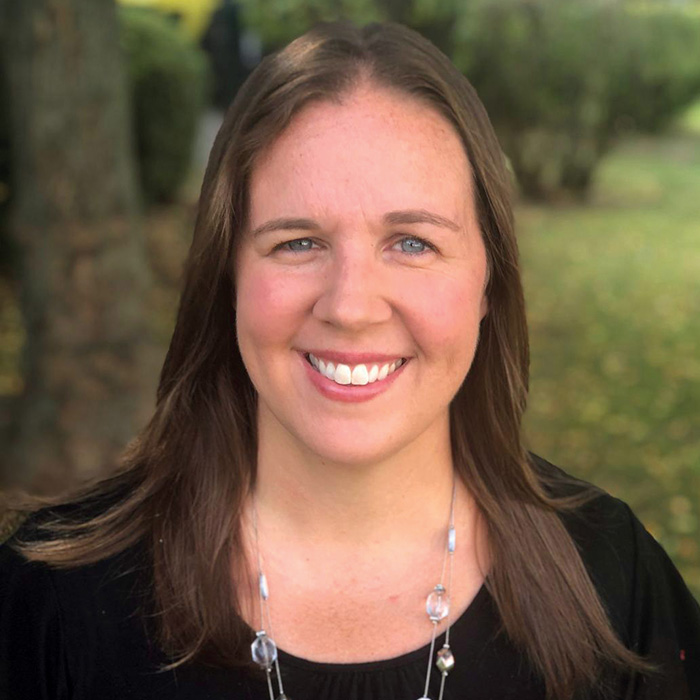
Jennifer Allen.
Courtesy of Jennifer Allen
Jennifer Allen is one of this year’s runners-up for the M. Juanita Guess Award for her leadership as community liaison office (CLO) coordinator at U.S. Consulate General Guangzhou during a health alert crisis in 2018. In May of that year, the consulate learned that one of its employees was found to have medical findings consistent with the “Havana Syndrome” symptoms suffered by embassy personnel in Cuba.
The news sent shockwaves through the large Guangzhou consulate community. As CLO, Ms. Allen played a key role in managing the crisis. On hearing the news, some employees feared for the safety of their family members and began making plans to depart post, while others worried that their tour in subtropical China would come to an abrupt end, disrupting their careers and children’s education.
Having built strong and trusting relationships with nearly everyone at post, Ms. Allen was uniquely placed to provide feedback on the community to post, mission and department leaders struggling with how to best manage the situation. Ms. Allen kept the front office in Beijing as well as consulate management apprised of the situation amid the constantly swirling rumors and speculation flowing around the community. Post leadership used this information to tailor town hall presentations to effectively lead the community though the crisis.
Originally from California, Jennifer Allen has spent the past 17 years traveling the world with her consular-coned husband and family. After previous postings in Dili, Seoul, Barbados, Busan, Shenyang, Taipei and Guangzhou, her recent move to Frankfurt represents an entirely new continent to explore.
Prior to her Foreign Service life, Ms. Allen worked as a school counselor. After finding her passion for working in the Community Liaison Office in Shenyang, Jennifer has spent the last three years serving as CLO coordinator in Guangzhou, and is excited to continue in this role in Frankfurt.
M. Juanita Guess Award Runner-Up
JONETTE CAHOON VAUGHAN
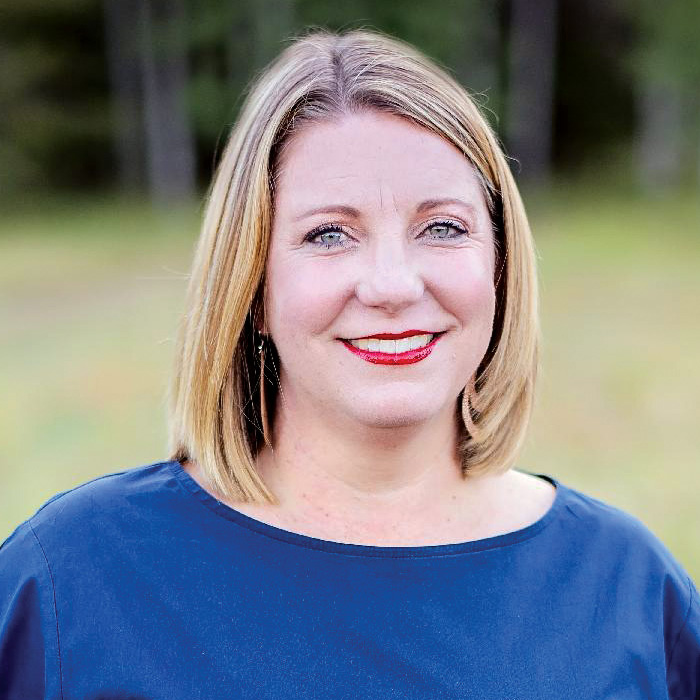
Jonette Vaughan.
Courtesy of Jonette Vaughan
Jonette Cahoon Vaughan is a runner-up for this year’s M. Juanita Guess Award for her outstanding work as community liaison office coordinator serving the U.S. Consulate General Frankfurt community.
The Frankfurt consulate is one of the largest in the world, and 80 percent of the direct-hire employees have regional responsibilities that keep them on the road for weeks at a time. The spouses left behind can feel unsupported. But Ms. Vaughan’s outreach skills, compassion and uncanny ability to connect with people have made a big difference for family members.
The Frankfurt consulate general community experienced several traumatic events during the past year. In June, an 8-year-old girl died after falling from a window at the housing compound. In February, a colleague died unexpectedly. And in November 2018, ConGen Frankfurt’s facility manager passed away in his sleep. In each case, Ms. Vaughan expertly shepherded the community through the difficult emotional aftermath of each tragic event.
Jonette Cahoon Vaughan has served as the CLO in Ouagadougou and Frankfurt. Before her Foreign Service life, she lived in New York City, Singapore and Washington, D.C. She loves to run, read, travel and connect with people.
Mark Palmer Award Runner-Up
ROBERT WORKS
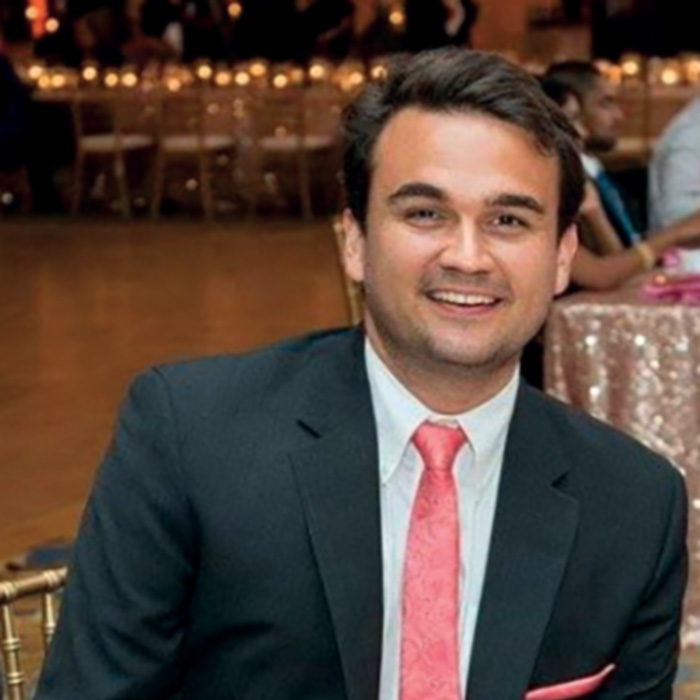
Robert Works.
Courtesy of Robert Works
Robert Works, a USAID Foreign Service officer, is recognized for his outstanding work promoting democracy in Nicaragua.
In 2018 and 2019, Nicaragua suffered its most violent political crisis since the 1980s. The government suddenly cracked down on peaceful protests, killing more than 325 Nicaraguans, detaining more than 700, injuring thousands and forcing some 50,000 people to flee the country. The political crisis resulted in an ordered departure for most American staff, including Mr. Works’ supervisor.
Thrust into a high-profile leadership position, Mr. Works led two of the U.S. government’s frontline responses to the crisis. He assumed the management of USAID’s in-country democracy and emergency response programming, oversaw the office’s six staff members and managed the State Department’s “Lifeline” rapid response program, typically run by the embassy’s political section.
As a junior officer saddled with complex responsibilities that are highly scrutinized, Mr. Works showed creative leadership that quickly became a crucial lifeline to civil society organizations, journalists, human rights defenders and emerging rural and student leaders—many of whom were attacked, jailed or killed by their own government. As a result of Mr. Works’ leadership, the U.S. government built trust with Nicaragua’s emerging leaders, strengthened their newly formed democratic movements and empowered journalists to hold the government accountable.
Robert Works is a democracy, human rights and governance officer with USAID, currently serving as the elections team lead in Kabul, Afghanistan. Before Kabul, he served on a short-term assignment with USAID/Ukraine, where he worked on elections programming during the country’s historic presidential elections.
Mr. Works was nominated for the Mark Palmer Award for the Advancement of Democracy for his work as a first-tour officer in Nicaragua, where he played a critical role in helping the U.S. government build trust with Nicaragua’s emerging youth leaders. From 2016 to 2017, Mr. Works was a Penn Kemble Fellow at the National Endowment for Democracy. In 2012, Robert earned a master's degree in philosophy at the University of Cambridge and is a 2010 graduate of the University of Louisville, where he was part of the McConnell Scholars Program.



